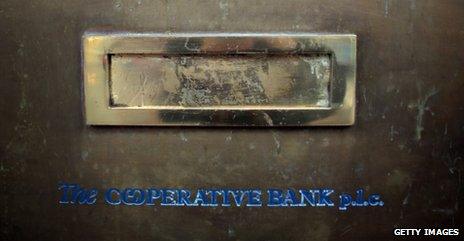Co-op woes embarrass regulators and Treasury
- Published
- comments

For the wider Co-op group or movement, banking is turning into a hideously expensive business.
As the Co-op evaluates - in partnership with the newly created regulator, the Prudential Regulation Authority - how much additional capital it needs to find as a protection against losses, we will learn quite how expensive.
But the woes of the Co-op have the potential to be expensive, in a reputational sense - and not just for the Co-op's management.
Remember this is a bank that until only a few weeks ago was negotiating to buy 631 branches from Lloyds and thus treble in size.
And it was doing this with the blessing of the Treasury and chancellor of the Exchequer, who last year hailed the Co-op's expansion as creating "a new challenger bank" that would give "real choice to customers and supports the economy".
What's more, the regulator, the now disbanded Financial Services Authority, did not veto the Co-op's plan to massively expand - which looks a bit odd, now that the Co-op is assessing whether the costs of running its much smaller operation are affordable.
And it is not as though the Co-op's problems came out of a clear blue sky,
A couple of years ago, a financier planning a possible bid for Lloyds branches told me - and the FSA - that he did not believe that the Co-op was strong enough in a financial, management or IT sense to acquire the Lloyds branches and assets.
He was told by the FSA that the decision on the best bidder would be a "political one" not a regulatory one.
Hmmm.
What's more, the Co-op Bank's accounts should perhaps have given a pretty good warning of problems ahead.
I looked at these in some detail over the weekend, and they make pretty grim reading.
Here is what stood out for me. At the end of 2011, the Co-op Bank had £1.45bn of corporate loans on its "watchlist". In other words, it thought that £1.45bn of lending to companies - much of it property lending - could go bad.
Why didn't that warning of potential trouble afoot ring stronger alarm bells for the Co-op Group's top management, or for Lloyds, or the FSA or the Treasury - all of whom might have wondered whether the Co-op was the best buyer of Lloyds's branches?
The point is that in the subsequent year, many of the companies with loans on the Co-op's watchlist did in fact default. Corporate loans in default at the Co-op jumped from £922m to just under £2bn.
And that rise in defaults was a big contributor to the colossal £674m loss that the Co-op incurred in 2012.
So here's another source of potential embarrassment for the now defunct FSA. Many of the loans that have gone bad at the Co-op were acquired when it bought the Britannia Building Society in 2009 - a takeover that was regarded by the FSA at the time as very helpful, because it apparently strengthened the Britannia.
What we now know is that the strengthening of the Britannia has weakened the Co-op.
So how much additional capital will the Co-op have to find for its bank?
The information in its latest accounts makes it difficult to be precise - except that the £800m it hopes to raise from the sale of its life and general insurance operations will not be enough (I am authoritatively told), so it may well be obliged to sell or mortgage some of its non-financial operations.
Here are what I regard as the important numbers.
At the end of 2012, the Co-op had £3.7bn of commercial loans, home loans and personal loans that it classified as impaired or bad. Against that, it was holding a provision for potential losses on these loans of £643m.
In other words the Co-op believes it will ultimately lose just 17% of these bad loans.
At the same time, the Co-op has loss-absorbing equity capital of £1.6bn.
Or to put it another way, impaired loans minus provisions for losses as a percentage of loss-absorbing capital is 194%.
Which is another way of saying the Co-op has a good deal of additional capital to find.
Are its woes wealth imperilling for its depositors and savers (or rather for those with more than the £85,000 insured limit)?
I think that is unlikely. As I said on Friday, the wider Co-op group has other assets it can sell to plug the hole.
And there's another thing. Having welcomed the Co-op's plan to buy Lloyds branches, and having therefore invested his personal capital in the Co-op, the chancellor can't afford for there to be a serious accident at that bank.
As I said on Radio 4's Today programme this morning, the Treasury will be working over time with the Prudential Regulation Authority to find an orderly way to ensure it continues to be business as usual for the Co-op's customers.